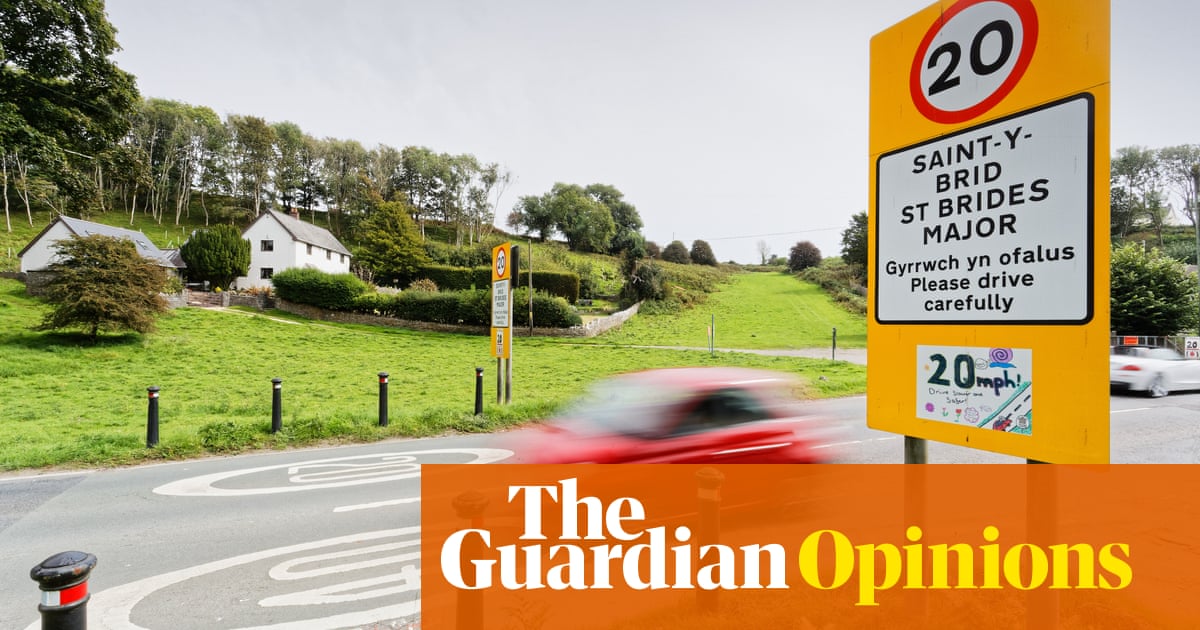I still can’t quite get over the fact that a scheme designed to save the lives of children became the latest culture war battlefield.
not even counting the long-term savings to the NHS from people taking up cycling or walking instead of driving, or the savings for many Welsh drivers caused by the reduction in their insurance premiums
Not sure if it belongs here but I thought it showed how hard it is to even change small things.
So why all the outrage? Well, it turns out that much of it was manufactured. In January of this year I did a little digging through four of the main Facebook groups opposing the change to 20mph in Wales. I found that in each case one of the admins was a Tory councillor from Sunderland who has, and this is hilarious, campaigned to have 20mph limits in parts of his home town.
Conservative politican scum baggery ?
Ultimately, the 20mph change was an attempt to rebalance the communities in which we live, so they are no longer dominated by cars. The policy aims to make our neighbourhoods more livable (20mph is three decibels lower than 30mph). It has a positive impact on particulate pollution because cars have to brake less. And it clearly saves lives.



As someone who drives in Wales a fair bit, it was badly implemented so it became unpopular.
The blanket rule was applied to roads it shouldn’t have been, with a slow and costly process to fix the speed limits on roads that’s shouldn’t have been covered.
It makes sense on all side streets, but it doesn’t make sense on all main roads. Some yes, but not all inside towns and cities. I think this is being unpicked it seems with more flexibility for councils? I don’t really follow Welsh politics, like many people I suspect.
The other issue is enforcement or lack there of. There seems to be zero enforcement so you get into the situation of driving down roads and everyone is still going at 30 ignoring the law. It puts you under pressure to go at 30 and it’s easy to drift up to that speed.
I’m am generally a supporter of the new law but the politicians have to take ownership that the reason it’s controversial is because it was poorly implemented. Its easy to paint the critics as extreme or as part of a “culture-war” but that’s just people taking advantage of actual anger and frustration.
The policy can be popular I think - there just needs to be some minor changes. As an example I can think of 4 roads in the town I drive or walk on that could do with going back to 30mph; thats nothing in the 100s of roads in the area.
It’d even potentially be safer as people are just breaking the law and speeding on these road anyway making it less predictable for pedestrians.
An example is a long main road that climbs up a steep hill in my town. It’s actually a struggle. climbing it at 20mph, and I even get foot pain trying to keep the accelerator at just the right depression to stay at 20mph. The road is wide too so you’re struggling all the time with the accelerator, monitoring your speed as it’s natural to go faster on wide roads and other drivers putting you under pressure to go faster. People are even overtaking each other which can be dangerous as you don’t always see what’s coming down the other way easily.
So I’d be worrying less about the fringe lunatics stirring up anger and more about tweaking the implementation to get the majority on board. That’ll take the support and interest away from the fringe noise makers.
I fully accept your built environment argument, and everything else you are saying. But this? “It’s actually a struggle. climbing it at 20mph, and I even get foot pain trying to keep the accelerator at just the right depression to stay at 20mph.” Means you are physically unfit to drive. It’s also a maximum, you’re allowed to go below 20 mph.
You can go slightly under the speed limit but going much slower for no reason could get you pulled over. It’s also something you would fail to pass your test on if you were driving under the limit for no reason.
Onto the struggle point I don’t really understand the foot pain thing, there’s barely any travel on the accelerator between 20mph and 30. Personally I find the struggle is finding the right gear to stick to 20. It’s too fast for 2nd gear, but a bit too slow for third, at least that’s the case for our car.
I feel like this is something everyone says but how often does this actually happen? Not often I’d guess, unless the police officer is bored, or it’s at an hour where they’re out looking for drunk drivers anyway
Yep. I live in Wales, and I agree with pretty much everything you’ve said. I wrote a long reply to a similar post a little while back that’s here if anyone wants to read it:
https://lemmy.dbzer0.com/comment/12463901
The gist of it is though that the speed limit was badly implemented, was announced at around the same time as the bus budget was slashed and major railway work started, and has caused the number of running buses to be reduced.
The changes were supposed to be a way to push people onto public transport, but now instead of the buses running every 10 minutes, they’re every 15 minutes. The railway work has literally finished this week. Our local MS (Welsh equivalent to an MP) posted today that she rode on the first electric train. A train that’s had the toilets removed and takes longer to get back from the nearest city.